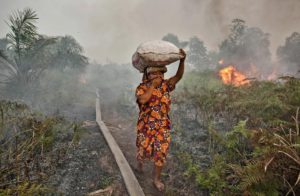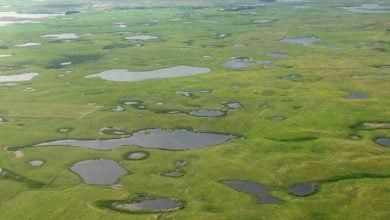 A recent New York Times report shed light on big banks’ investment in the Rajawali Group, a large Indonesian conglomerate linked to major deforestation and forest burning in the region in its drive to expand its vast palm oil plantations.
A recent New York Times report shed light on big banks’ investment in the Rajawali Group, a large Indonesian conglomerate linked to major deforestation and forest burning in the region in its drive to expand its vast palm oil plantations.
The article cited Bank of America and Credit Suisse as contributors to the company’s $235 million in loans secured this year, part of a larger $43 billion deal funding companies linked to deforestation and forest burning in Southeast Asia. Many of the banks that contributed funds have made pledges of sustainability, specifically mentioning deforestation, such as Bank of America did in its 2004 policy that stated it would not fund projects that clear primary tropical moist forests.
Of course, the practice of “greenwashing” by corporations is nothing new. A few statements here and there to win public support, while moving forward with business-as-usual practices to please investors, are part of the status quo under capitalism.
Deforestation is a leading perpetuator of climate change, through destruction of ecosystems that sequester carbon from the atmosphere and loss of species diversity.
Additionally, the massive fires set to clear land for palm plantations put huge amounts of greenhouse gas emissions into the atmosphere, exacerbating global warming. These fires contribute one-tenth of the total global warming emissions annually. Daily emissions from Indonesia’s forest fires last year exceeded all emissions produced in the U.S. that year, which is major considering that the U.S. is the largest per capita polluter globally. Also, clearing forest for monocrop cultivation compounds the damage, as mono-cropping is widely known to cause soil degradation and the proliferation of pests.
The smoke from the massive fires that spread throughout the region last year caused at least 100,000 premature deaths throughout Southeast Asia. Emissions from fires cause asthma and other respiratory illnesses, affecting children and the elderly the most.
Indonesia is losing forest at the alarming rate of 2.1 million acres per year, the highest globally, with lost forest area 4.5 times the size of Bali in 2015 alone. Capitalism through its insatiable plunder of resources for profit is to blame. The palm oil market has exploded in recent years spurring investments from capitalists worldwide. The archaic nature of capitalism does not take into account what products or resources are actually needed or sustainable, but rather follows market trends of the latest hot commodity at the expense of people and the planet.
Not only are big banks investing in projects linked to deforestation, but also other major contributors to climate change, such as fossil fuels. A 2016 report entitled Shorting the Climate: Fossil Fuel Finance Report Card 2016, revealed that 25 US., European and Canadian banks have large investments in companies involved in extreme fossil fuels, such as coal mining, coal power, and extreme oil (tar sands, Arctic oil, ultra-deep drilling).
As we have stated in previous articles, capitalism, where the market determines investments instead of human and environmental needs, is completely incapable of solving the climate crisis. Under capitalism we will continue to chase one corporation after another through the court systems in attempt to get them to comply to already inadequate regulations and agreements with the best outcome being a meager fine that barely puts a dent in their quarterly returns. We need a revolution and a socialist planned economy to solve the crisis—where all the resources and scientific knowledge can be pooled to solve the greatest challenge we have ever faced as a species.






